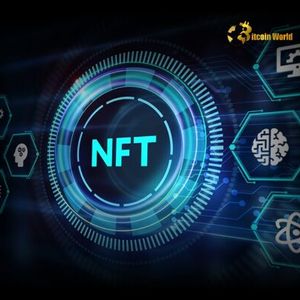BitcoinWorld Bitcoin Security: Urgent Quantum Computing Risk Revealed Is the future of cryptocurrency security under threat? A recent revelation from Google suggests that a powerful, disruptive technology could impact the very foundations of crypto-grade encryption sooner than many experts anticipated. This isn’t just theoretical chatter; it comes from the cutting edge of quantum research, raising questions about the long-term resilience of our digital locks, including those safeguarding Bitcoin. Understanding the Looming Threat: Quantum Computing For years, quantum computing has been discussed as a potential future risk to current encryption standards. Unlike classical computers that store information as bits (0 or 1), quantum computers use qubits, which can be 0, 1, or both simultaneously. This allows them to perform certain calculations exponentially faster than classical computers. While large-scale, fault-tolerant quantum computers are still some years away, progress is being made. The concern for cryptocurrency and other secure systems lies in the ability of quantum computers to potentially break the mathematical problems that underpin today’s most common public-key encryption methods. The Impact on RSA Encryption and Google’s Findings A key piece of this puzzle involves RSA encryption , one of the most widely used public-key cryptosystems globally. RSA’s security relies on the difficulty of factoring very large numbers – a task that takes classical computers an impractical amount of time. However, this is where quantum computers pose a significant threat. A recent research paper by Google Quantum AI researcher Craig Gidney, reported by CoinDesk, presented a potentially concerning finding. The paper suggests that breaking RSA encryption using a quantum computer may require significantly fewer resources – potentially 20 times fewer – than previous estimates indicated. This doesn’t mean it’s possible tomorrow, but it does suggest the path to breaking RSA with quantum machines might be less resource-intensive than the cryptographic community had assumed. Think of it like this: If previous estimates said you needed a quantum computer the size of a skyscraper to break RSA, this new research suggests you might only need one the size of a large building. Still massive and complex, but a noticeable reduction in the required resources, potentially accelerating the timeline. How Shor’s Algorithm Threatens Modern Crypto The specific quantum algorithm that poses this threat is Shor’s algorithm , developed by mathematician Peter Shor in 1994. Shor’s algorithm can efficiently solve the integer factorization problem (used by RSA) and the discrete logarithm problem (used by Elliptic Curve Cryptography, or ECC). Both of these problems are considered computationally hard for classical computers, forming the basis of modern public-key cryptography. Here’s a simplified view of why Shor’s algorithm is so powerful against these systems: RSA: Relies on the difficulty of factoring a large composite number (the product of two large primes). Shor’s algorithm can find these prime factors efficiently. ECC: Relies on the difficulty of solving the discrete logarithm problem in an elliptic curve group. Shor’s algorithm can solve this problem efficiently as well. While the mathematical underpinnings are different, Shor’s algorithm provides a quantum shortcut for both. The Specifics: Bitcoin Security and ECC Now, let’s talk about Bitcoin security . Bitcoin does not use RSA encryption for its transaction signatures or wallet addresses. Instead, it primarily relies on Elliptic Curve Digital Signature Algorithm (ECDSA), which is based on Elliptic Curve Cryptography (ECC). As mentioned, ECC is also vulnerable to Shor’s algorithm. Does this mean Bitcoin is immediately at risk? Not necessarily. There are nuances: Current Quantum Computers: The quantum computers built today are nowhere near powerful enough to run Shor’s algorithm at the scale required to break the large key sizes used in Bitcoin (typically 256-bit ECC keys). Address Reuse: The most vulnerable aspect of Bitcoin to Shor’s algorithm is when a user reuses a Bitcoin address after funds have been spent from it. At this point, the public key is exposed on the blockchain, making it theoretically vulnerable to a quantum attack if a powerful enough machine exists. Addresses used only for receiving funds (where only the hash of the public key is public) are considered more resistant, though not entirely immune to potential future attacks. Resource Estimates: While the Google paper focused on RSA, the implications for ECC are also relevant. Breaking ECC with Shor’s algorithm is generally estimated to require a quantum computer roughly the same size (in terms of qubits) as breaking RSA keys of comparable security strength, though specific estimates can vary. The Google paper didn’t specifically mention Bitcoin or ECC, but its finding that breaking one major public-key system (RSA) might be easier than thought naturally raises the question about the timeline for breaking other systems like ECC, which Bitcoin uses. The ‘Faster Than Expected’ Timeline: What Does it Mean? The phrase ‘faster than expected’ is relative. Experts have long placed the ‘quantum-apocalypse’ timeline for breaking current crypto somewhere between 10 to 30 years away, or even longer. The Google finding, suggesting a 20x reduction in required resources for RSA, could potentially shave some years off that estimate, at least for RSA. For ECC and Bitcoin, it reinforces the idea that the threat is real and warrants serious attention from researchers and developers. It’s crucial to understand that building a fault-tolerant quantum computer capable of running Shor’s algorithm on large keys is an immense engineering challenge. It requires millions of high-quality qubits and sophisticated error correction. We are currently in the era of noisy, intermediate-scale quantum (NISQ) computers, which are far too small and error-prone for this task. However, the pace of quantum computing advancements is indeed accelerating. Governments and private companies are investing billions in this technology. Findings like Google’s highlight the importance of not being complacent. Addressing the Quantum Threat: The Rise of Post-Quantum Cryptography The cryptographic community is not sitting idle. Researchers worldwide are actively developing and standardizing new encryption algorithms designed to be resistant to attacks from future quantum computers. This field is known as Post-Quantum Cryptography (PQC) . The National Institute of Standards and Technology (NIST) in the United States has been running a multi-year process to evaluate and select the most promising PQC algorithms. Several candidates have reached the final stages, focusing on mathematical problems that are believed to be hard for both classical and quantum computers, such as lattice-based cryptography, hash-based cryptography, and code-based cryptography. Integrating these new algorithms into existing systems, including cryptocurrencies, will be a significant undertaking. It will require careful planning, testing, and consensus within the respective communities. Challenges and Actionable Insights for the Crypto Community The primary challenge is the uncertainty of the timeline. While the threat is real, predicting exactly when a large enough quantum computer will exist to break current crypto is impossible. This makes it difficult to know precisely when migration to PQC is critically necessary. For the average cryptocurrency user, the actionable insight is primarily one of awareness and preparedness: Stay Informed: Follow developments in both quantum computing and post-quantum cryptography. Support Research: Understand that ongoing research into PQC and its integration into blockchain technology is vital for long-term security. Address Reuse: As a good security practice, avoid reusing Bitcoin addresses, as this exposes your public key and is the most direct vector for a potential future quantum attack using Shor’s algorithm. Wallet Updates: In the future, expect wallet software and blockchain protocols to require updates to incorporate post-quantum secure algorithms. Ensure you keep your software updated when these solutions become available. For developers and protocol designers, the challenge is more immediate: evaluating PQC candidates, understanding their performance implications for decentralized systems, and planning for a potential future transition. Summary: A Quantum Future Requires Preparation Today The recent Google research highlighting that breaking RSA encryption might require fewer quantum resources than previously thought is a significant data point, reinforcing the growing concerns about the pace of quantum computing advancements. While Bitcoin’s use of ECC doesn’t make it directly vulnerable to the RSA-specific finding, both ECC and RSA are ultimately susceptible to Shor’s algorithm if a sufficiently powerful quantum computer is built. This revelation serves as a stark reminder that the quantum threat to current crypto encryption is not science fiction; it’s a foreseeable challenge. While the exact timeline remains uncertain, the cryptographic community is actively working on solutions through post-quantum cryptography. For the crypto world, this means continued vigilance, research, and eventual migration to quantum-resistant algorithms will be necessary to ensure the long-term security and integrity of blockchain networks like Bitcoin. To learn more about the latest Bitcoin security trends, explore our article on key developments shaping Bitcoin security in the coming years. This post Bitcoin Security: Urgent Quantum Computing Risk Revealed first appeared on BitcoinWorld and is written by Editorial Team



















